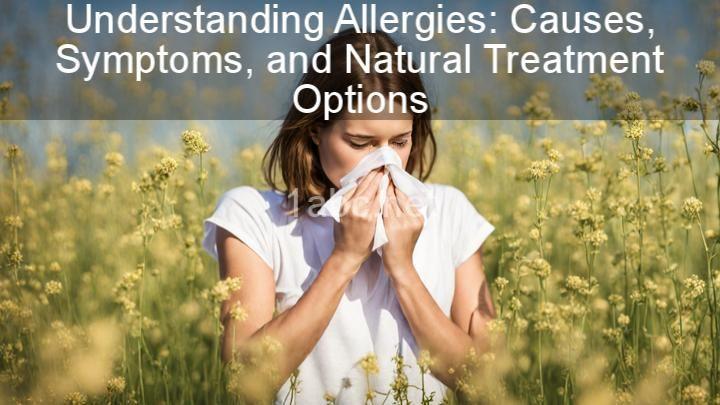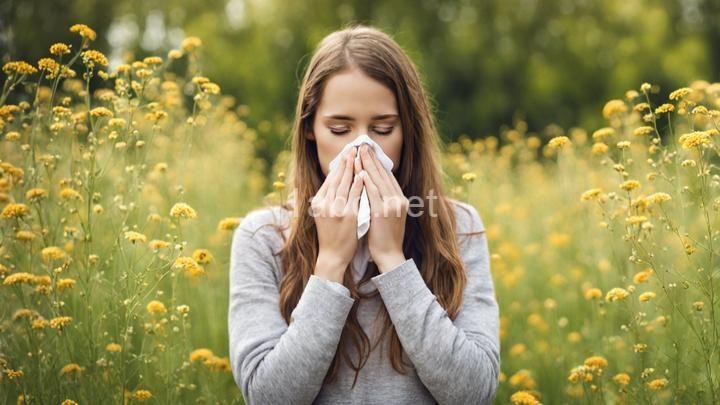Understanding Allergies: Causes, Symptoms, and Natural Treatment Options

I. Introduction
Allergies are a common occurrence in today's world, affecting millions of people worldwide. Understanding allergies is crucial not only for those who suffer from them but also for those around them. By having a better understanding of allergies, we can mitigate their impact on daily life and improve overall quality of life.
To put things into perspective, did you know that approximately 50 million Americans suffer from allergies each year? That's about 1 in 5 people! Allergies can range from mild to severe, and they can significantly affect an individual's physical and emotional well-being. In this blog post, we will delve into the causes, symptoms, and natural treatment options for allergies.
II. What are Allergies?
To understand allergies, we must first define what they are and how they differ from other immune responses. Allergies occur when the immune system reacts to a harmless substance as if it were a threat to the body. These substances, known as allergens, can vary from pollen and pet dander to certain types of food. When an allergic individual comes into contact with an allergen, their immune system triggers a response, releasing chemicals such as histamine, which cause the familiar allergy symptoms.
Unlike other immune responses, allergies are not typically triggered by harmful substances. Instead, they are an overreaction of the immune system. This overreaction can lead to a variety of symptoms, depending on the type of allergy and the individual's sensitivity to the allergen.
III. Common Causes of Allergies
Several factors can contribute to the development of allergies. Environmental factors, such as air pollution and exposure to certain chemicals, have been linked to an increased risk of allergies. Additionally, genetics play a significant role in determining an individual's susceptibility to allergies. If one or both parents have allergies, their children are more likely to develop allergies as well.
Furthermore, a compromised immune system can make an individual more prone to developing allergies. Factors such as poor nutrition, chronic stress, and underlying health conditions can weaken the immune system's ability to defend against allergens effectively.
IV. Recognizing Allergy Symptoms
Allergy symptoms can vary depending on the type of allergy and the individual's sensitivity. However, some common symptoms include sneezing, itching, runny nose, congestion, and watery eyes. These symptoms are often associated with respiratory allergies, commonly known as hay fever or allergic rhinitis.
On the other hand, food allergies can cause symptoms such as hives, swelling, digestive issues, and in severe cases, anaphylaxis. It's important to note that food allergies can be life-threatening and require immediate medical attention.
Identifying triggers is crucial for managing allergy symptoms effectively. By understanding what substances or situations cause an allergic reaction, individuals can take proactive steps to reduce their exposure and minimize symptoms.
V. Natural Treatment Options for Allergies
Conventional treatment options for allergies often involve the use of antihistamines and other medications that aim to alleviate symptoms. While these treatments can be effective, they may come with side effects or provide only temporary relief. Many individuals are turning to natural remedies to manage their allergies and reduce their reliance on medication.
- Herbal remedies and supplements: Several herbs and supplements have shown promise in reducing allergy symptoms. For example, butterbur extract has been found to be as effective as antihistamines in relieving hay fever symptoms. Similarly, quercetin, a natural compound found in foods such as onions and apples, has anti-inflammatory properties and may help alleviate allergic reactions.
- Nasal rinses and saline sprays: Nasal rinses, using a saline solution, can help flush out allergens from the nasal passages, reducing congestion and sinus issues. Saline sprays can also provide relief by moisturizing the nasal passages and reducing inflammation.
- Dietary changes and allergen avoidance: Making dietary changes can be an effective way to manage allergies. Avoiding known allergens, such as dairy, gluten, or nuts, can help reduce symptoms. Additionally, incorporating anti-inflammatory foods, such as fruits, vegetables, and omega-3 fatty acids, can support overall immune health.
VI. Lifestyle Adjustments for Managing Allergies
In addition to natural treatment options, certain lifestyle adjustments can help manage allergies and improve overall well-being.
A. Maintaining a clean environment: Keeping your living space clean and free from allergens can significantly reduce exposure. Regularly dusting, vacuuming, and using air purifiers can help remove allergens from the air, providing relief for allergy sufferers.
B. Regular exercise: Engaging in regular exercise can strengthen the immune system and help reduce the frequency and severity of allergic reactions. Exercise can also help manage stress, which can worsen allergy symptoms.
C. Stress management techniques: Stress can have a negative impact on the immune system, making allergies worse. Implementing stress management techniques such as meditation, deep breathing exercises, and engaging in hobbies can help reduce stress levels and alleviate allergy symptoms.
VII. Conclusion
Understanding allergies is essential for anyone who experiences them or knows someone who does. By comprehending the causes, symptoms, and natural treatment options for allergies, individuals can take control of their health and manage their allergies effectively. It is important to remember, however, that everyone's experience with allergies is unique, and consulting with healthcare professionals is crucial for personalized advice and treatment options.
In conclusion, allergies may be a common occurrence, but they don't have to be a hindrance to living a happy and healthy life. By being informed and proactive, individuals can reduce the impact of allergies and enjoy a better quality of life. Let us embrace the knowledge and understanding of allergies, and together, we can make a difference.
FREQUENTLY ASKED QUESTIONS
What is Understanding Allergies: Causes, Symptoms, and Natural Treatment Options?
Understanding Allergies: Causes, Symptoms, and Natural Treatment Options is a comprehensive guide that provides insights into the various aspects of allergies. It covers the causes of allergies, including environmental factors, genetic predisposition, and immune system reactions. The guide also explores common symptoms associated with allergies, such as sneezing, itching, nasal congestion, and skin rashes.
Additionally, Understanding Allergies discusses natural treatment options that can help alleviate allergy symptoms. This includes lifestyle changes, such as reducing exposure to allergens and implementing a healthy diet. The guide also explores the use of natural remedies, such as herbal supplements and essential oils, which may offer relief from allergy symptoms.
Understanding Allergies aims to provide a well-rounded understanding of allergies and empower individuals to make informed decisions regarding their health and well-being.
What are the common causes of allergies?
Common causes of allergies include:
- Pollen: Allergic reactions to pollen from trees, grasses, and weeds are known as hay fever or seasonal allergies.
- Dust mites: These microscopic creatures live in household dust, bedding, and upholstery and can trigger allergic reactions.
- Mold: Indoor and outdoor molds release spores that can cause allergies, especially in humid or damp environments.
- Pet dander: Allergies to pets are typically triggered by proteins found in the animal's skin cells, urine, or saliva.
- Insect stings: Allergic reactions to bee or wasp stings can cause severe symptoms, such as difficulty breathing and swelling.
- Certain foods: Common food allergens include nuts, eggs, milk, wheat, fish, shellfish, and soy. These allergies can range from mild to life-threatening.
- Medications: Some people may develop allergies to certain medications, such as antibiotics, nonsteroidal anti-inflammatory drugs (NSAIDs), or certain vaccines.
- Latex: Latex allergies may occur in individuals with repeated exposure, such as healthcare workers or people who frequently use latex gloves.
- Chemical irritants: Certain chemicals present in household cleaning products, perfumes, and cosmetics can trigger allergic reactions in sensitive individuals.
It is important to note that these are general causes, and individual reactions can vary. If you suspect you have allergies, it is recommended to consult with a healthcare professional for proper evaluation and diagnosis.
What are the different types of allergies?
There are various types of allergies, including:
- Seasonal allergies: These allergies occur during specific seasons and are caused by substances such as pollen, grass, or mold spores.
- Food allergies: Food allergies occur when the immune system reacts to certain proteins found in particular foods, such as peanuts, tree nuts, shellfish, wheat, or dairy.
- Drug allergies: These allergies are triggered by certain medications and can cause mild to severe reactions.
- Animal allergies: Some people are allergic to proteins found in the dander, saliva, or urine of animals like cats, dogs, or rodents.
- Dust mite allergies: Dust mites are tiny insects that live in house dust, and their droppings can trigger allergic reactions in sensitive individuals.
- Insect sting allergies: Allergic reactions to insect stings from bees, wasps, hornets, or fire ants can range from mild to life-threatening.
- Latex allergies: Latex, a type of rubber, can cause allergic reactions in some individuals, particularly those who frequently come into contact with latex products.
- Mold allergies: Mold spores that are present in damp environments, such as basements or bathrooms, can trigger allergic reactions.
- Pollen allergies: Pollen from trees, grasses, and weeds can cause hay fever or allergic rhinitis in some individuals.
- Chemical allergies: Certain chemicals found in a wide range of products can cause allergic reactions, such as cosmetics, cleaning supplies, or perfumes.
It's essential to consult with a healthcare professional if you suspect you have allergies to determine the specific type and appropriate treatment.
What are the symptoms of allergies?
The symptoms of allergies can vary depending on the type of allergy and the severity of the reaction. Common symptoms of allergies include:
- Sneezing
- Runny or stuffy nose
- Itchy or watery eyes
- Coughing or wheezing
- Itchy throat or ears
- Skin rash or hives
- Fatigue
- Headache
- Sinus congestion
- Shortness of breath
It is important to note that these symptoms can be similar to those of other respiratory conditions, so it is advisable to consult a healthcare professional for an accurate diagnosis.




